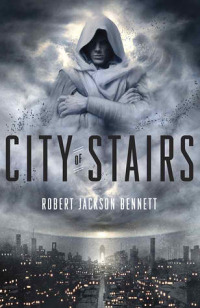City of Blades by Robert Jackson Bennett
 Wednesday, March 2, 2016 at 7:22AM
Wednesday, March 2, 2016 at 7:22AM 
Published by Broadway Books on January 26, 2016
City of Stairs didn’t need a sequel but I have no complaint about Robert Jackson Bennett’s decision to write one. City of Blades is less surprising than City of Stairs, but that’s to be expected in a sequel. There is plenty of action and excitement, and if City of Blades didn’t blow me away as did City of Stairs, I nevertheless enjoyed reading it.
General Turyin Mulaghesh (retired), finds herself pressed back into service, this time to undertake an investigation for Shara Komayd. A new ore has been discovered in Voortyastan. The ore has unexplained properties. Shara worries that the ore may be miraculous, which would imply that a Divinity still exists (despite the presumption to the contrary at the end of City of Stairs). Since Divinities are nothing but trouble, the possibility that one survived is worrisome. A Saypuri spy with expertise in the miraculous, previously dispatched to study the ore, has disappeared. Hence the need for Mulaghesh.
City of Blades reunites Mulaghesh with Sigrud, my favorite character from City of Stairs. They explore the disappearance of the Saypuri spy and the nature of the miraculous ore while dealing with the unsettled political and military situations in Voortyashtan. A Saypuri outpost is building a harbor there to better serve Saypuri commerce, if not the Voortyashtani. Sigrud’s daughter Signe plays a key role in that effort, adding family drama to the plot.
Bennett always fills his books with interesting ideas. One of my favorites in City of Blades is the notion of Divinities (gods) creating an afterlife as a means of coaxing or coercing mortals into doing what they wanted (coaxing with a version of heaven, coercing with many imaginative versions of hell). But when the gods die, what happens to all the souls who have transitioned to afterlife?
Bennett’s books excel because he mixes ideas and plot with complex characters. City of Blades fleshes out Mulaghesh, explores her formative years as a soldier and the way her past has shaped her present. It does less with Sigrud until the end, which I found disappointing.
City of Blades lacks the moral heft of the first novel, although it offers a good lesson at the end about the heartache caused by the word “deserve.” The sequel doesn’t have the same depth as City of Stairs, but in the second half it develops some of the insight into human nature that makes City of Stairs so memorable. The novel is primarily an exploration of war -- all wars, the nature of war, its inevitable pointless horror -- as well as its impact not just on civilians, but on warriors. It is a story about the difference between soldiers and savages. The ideas expressed are not entirely original or profound, but they have the ring of truth.
If City of Blades is more predictable than its predecessor, that’s because it continues a spectacular universe and must necessarily pale in comparison to the first revelation of that universe. City of Blades still manages to tell a powerful story. The ending, in particular, is strong.
RECOMMENDED


